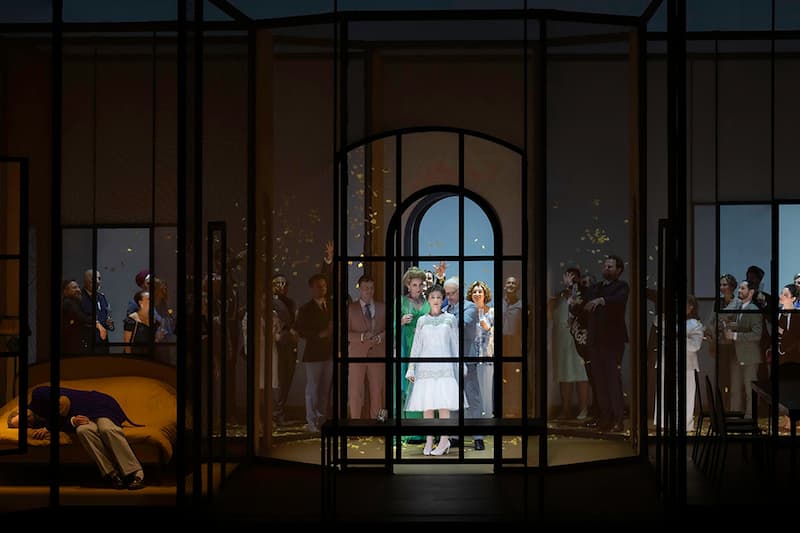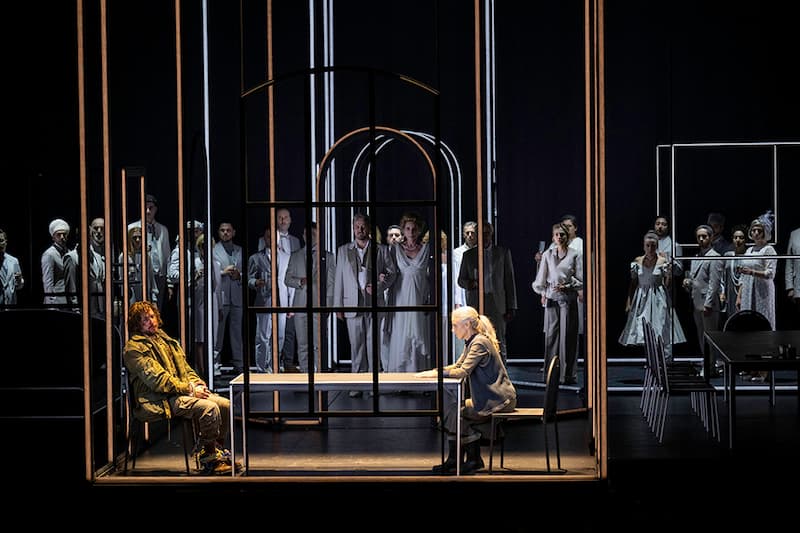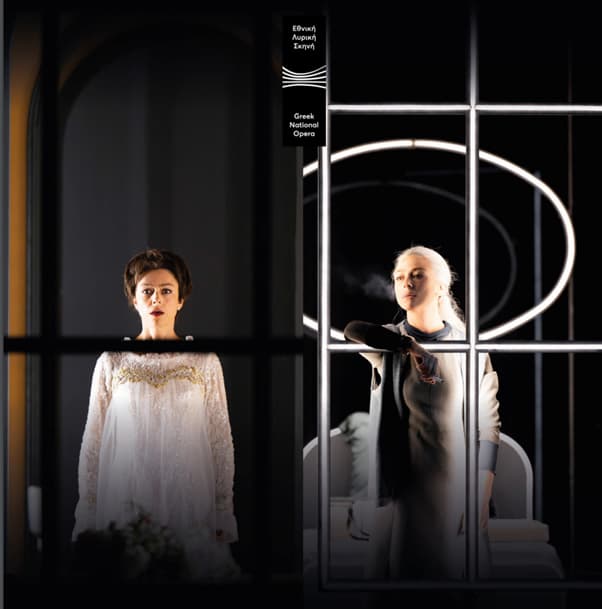In a very interesting double bill, Greek National Opera (GNO) put together Gluck’s Iphigénie en Aulide and its followup, Iphigénie en Tauride, which is set 20 years after the first opera.
The first opera, which received its premiere on 19 April 1774 by the Paris Opéra, was not an immediate hit but gained its audience and was given annually in Paris for the next 50 years. Agamemnon has been directed by the seer Calchas that the only way his wind-locked fleet will get to Troy will be by the sacrifice of his daughter Iphigenia to the goddess Diana, as demanded by Diana herself. For the next two hours, he twists and turns in his dilemma – first telling Iphigenia that there’s no need to come to the Greek camp because her intended Achilles has another lover, but he’s too late, Iphigenia has already arrived. Agamemnon’s lie is revealed, and the wedding plans go forward until it is revealed that the wedding altar is really intended to be a sacrificial altar. Iphigenia is willing because it’s for her beloved father. As she’s led to the sacrificial altar, Achilles and his men come to rescue her, and there’s a general fight; in the end, Diana herself appears and reverses her sacrifice decision. Iphigenia marries Achilles, and Agamemnon’s fleet can sail. Or, at least, that’s what Gluck’s 1775 revision had.
In the GNO version, the overture is set as a nightmare of Agamemnon’s: the wedding guests are all in place, Iphigenia is blindfolded by Calchas and wanders around, tripling over things until she is sacrificed. At that, the lights come up, and we realize it’s only his nightmare, and the opera starts.

Agamemnon (left) dreams of Iphigenia’s fatal wedding (Aix-en-Provence Festival)
Agamemnon (Tassis Christoyannis) was a wonderful match with his wife, Clytemnestra (Véronique Gens). The most pleasant surprise, however, was Iphigenia, sung by Corinne Winters. Slight and boyish at her first entrance, she seemed, at first, less impressive than her mother, but her voice was one of instant command. She cut through all of Agamemnon’s lies and her mother’s worries and pursued her own path. She has to convey gentleness, tenderness, and resignation, but, above all, the belief in her own path, even if it’s to be a sacrifice. Love and duty are the driving elements – love of family and duty to the family, the state, and the gods all have their place.
One unfortunate part of the evening was the tendency of the orchestra to bury the singers with an amplified harpsichord that was outstanding for all the wrong reasons. This was unexpected from the GNO Orchestra, which in other productions has been perfectly able to play their part without covering the singers.
For Gluck, this first opera for Paris was an experiment: he was returning to the ideal of the tragedie lyrique of Lully: dramatic efficiency, musical concision, the importance of text and declamation, the active role of the chorus, etc. Gluck’s operatic reforms, started in the early 1760s, emphasised melody simplicity, de-emphasised the division between recitative and aria, eliminated the word repetition in arias (with an emphasis on getting rid of da capo arias), and linked the overture to the rest of the opera by use of recurring melodic motifs or by setting up an overall mood. He didn’t accomplish all of this in his first opera, but many of these elements in the reform of French opera appeared here.
Christoph Willibald Gluck: Iphigénie en Aulide: Overture (Le Concert de la Loge; Julien Chauvin, cond.)
During intermission, the dropped curtain said only ΕIΚΟΣΙ ΧΡOΝΙΑ ΜΕΤA (20 Years Later).
We open in the same house of Agamemnon, but now with the scrim removed and each room, as it becomes active, outlined in light – Agamemnon’s bedroom is now a prison cell, and the reception hall is a room for questioning the captives.

Orestes is questioned by head priestess Iphigenia wedding (Aix-en-Provence Festival)
At the opening of Iphigénie en Tauride, it turns out that Iphigenia (and her companions) were magically transported from Aulide to Tauris in Scythia where Iphigenia is now the chief priestess of Diana. Iphigenia has a dream that her mother has killed her father, her brother Orestes has killed her mother, and then Iphigenia herself kills her brother. The king, Thoas, enters and tells her of his dream: any strangers in the country will mean his doom, so any strangers who come must be killed. Of course, the next shipwrecked strangers are her brother Orestes and his friend Pylades. Orestes and Pylades have a disagreement – Orestes feels guilty for causing Pylades’ death, and Pylades says not to worry because he’s happy that they will die together. Iphigenia interviews Orestes, asking him for news of Agamemnon, and he gives her the same news she dreamed of: Agamemnon is dead, and so is Clytaemnestra. He says that Orestes has found death and that only Electra remains. Iphigenia decides that she will only sacrifice one of the two captives, but they must choose who it will be – cue a fight by Orestes and Pylades to be the victim until Orestes is triumphant. Just like the ending of the first opera, when the time for the sacrifice comes, Pylades comes to rescue Orestes and Diana appears to acquit Orestes of his guilt. King Thoas, who has come to make sure Iphigenia does her duty, has a fatal epileptic fit at Pylades’ attack, and brother and sister are reunited. Diana orders the siblings to return to Mycenae.
The reunification of the siblings should signal Iphigenia’s return to Greece with Orestes, but at the end of this version, Orestes and Pylades go off together, and Iphigenia remains with the other Scythians, playing with plastic soldiers.
In many ways, this opera is about the remnants of war: everyone is dressed in layers of military clothing that are torn and dirtied, there’s a cold wind blowing, and everyone is bundled up. Thoas is not only a cruel king but one who keeps pulling his gun on everyone before falling on the floor in epileptic fits. More than once, Iphigenia tiredly pulls the gun from his hand to give it to his second-in-command, who takes it with an air of familiarity.
The tragedy of the operas comes from the original story in Greek mythology, mainly through Aeschylus’s trilogy The Oresteia. Agamemnon and his family are descendants of the house of Atreus, which has been damned by the gods for generations for various ill-judged killings and acts of revenge. In killing his mother, a necessity to avenge his father’s death, Orestes was caught between duty and matricide: ‘It was a son’s duty to kill his father’s murderers, a duty that came before all others. But a son who killed his mother was abhorrent to gods and to men’. Orestes’ action damns himself but redeems the house of Atreus and ends the gods’ curse.
In changing the end of the opera, the director has left the audience with a puzzle – why does Iphigenia remain in Scythia and not leave with her brother? Why do they go back to playing with toy soldiers? Is this just part of an unending cycle of war and destruction? It may be a modern commentary on the wars of Ukraine and Israel, but it doesn’t really serve Gluck’s opera very well.
The opera is a co-production between the Aix-en-Provence Festival and Opéra National de Paris. It had its premiere at the Aix Festival on 3 July 2024.
Opera Trailers

Iphigénie en Aulide & Iphigénie en Tauride cover
Iphigénie en Aulide & Iphigénie en Tauride
Christoph Willibald Gluck
Greek National Opera, Stavros Niarchos Hall
10, 13, 19, 22, 27, 30 Oct 2024
For more of the best in classical music, sign up for our E-Newsletter

